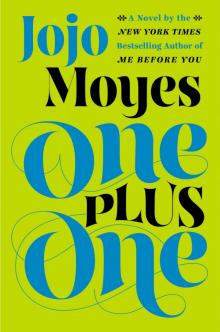- Home
- Jojo Moyes
After You Page 11
After You Read online
Page 11
“No. I—I went traveling for a bit, and now I’m working at an airport.”
“Oh! Good! British Airways, I hope?”
I felt my cheeks color.
“Management, is it?”
“I work in a bar. At the airport.”
He hesitated, just a fraction of a second, and nodded, firmly. “People always need bars. Especially at airports. I always have a double whisky before I get on a plane, don’t I, darling?”
“Yes, you do,” replied Della.
“And I suppose it must be rather interesting watching everyone fly off every day. Exciting.”
“I have other things in the pipeline.”
“Of course you do. Good. Good . . .”
There was a short silence.
“So when is the baby due?” I said, to shift everybody’s attention away from me.
“Next month,” said Della, her hands proudly resting on the swell of her belly. “It’s a girl.”
“How lovely. What are you going to call her?”
They exchanged the glances that parents-to-be do when they have chosen a name but don’t want to tell anyone.
“Oh . . . we don’t know.”
“Feels most odd. To be a father again, at my age. Can’t quite imagine it all. You know, changing nappies, that sort of thing.” He glanced at Della, then added, reassuringly, “It’s marvelous, though. I’m a very lucky man. We’re both very lucky, aren’t we, Della?”
She smiled at him.
“I’m sure,” I said. “How’s Georgina?”
Perhaps only I would have noticed how Mr. Traynor’s expression changed, just a degree. “Oh, she’s fine. Still in Australia, you know.”
“Right.”
“She did come over a few months ago . . . but she spent most of her time with her mother. She was very busy.”
“Of course.”
“I think she’s got a boyfriend. I’m sure someone told me she had a boyfriend. So that’s . . . that’s nice.”
Della’s hand reached across and touched his.
“Who’s Georgina?” Lily was eating a biscuit.
“Will’s younger sister,” said Mr. Traynor, turning to her. “Your aunt! Yes! In fact, she looked a little like you when she was your age.”
“Can I see a picture?”
“I’ll find you one.” Mr. Traynor rubbed the side of his face. “I’m trying to remember where we put that graduation photo.”
“Your study,” said Della. “Stay there, darling. I’ll get it. Good for me to keep moving.” She levered herself off the sofa and walked heavily out of the room. Lily insisted on going with her. “I want to see the rest of the photographs. I want to see who I look like.”
Mr. Traynor watched them go, still smiling. We sat and sipped our tea in silence. He turned to me. “Have you spoken to her yet? . . . Camilla?”
“I don’t know where she lives. I was going to ask you for her details. I know Lily wants to meet her too.”
“She’s had a difficult time of it. George says so, anyway. We haven’t really spoken. It’s all a bit complicated because of . . .” He nodded toward the door and let out an almost imperceptible sigh.
“Would you like to tell her? About Lily?”
“Oh, no. Oh . . . No. I—I’m not sure she’d really want . . .” He ran a hand over his brow. “Probably better if you do it.”
He copied out the address and phone number on a piece of paper and handed it to me. “It’s some distance away,” he noted, and smiled apologetically. “Think she wanted a fresh start. Give her my best, won’t you? It’s odd . . . to finally have a grandchild, in these circumstances.”
He lowered his voice. “Funnily enough, Camilla is the only person who could really understand how I’m feeling right now.”
If he had been anybody else I might have hugged him just then, but we were English and he had once been my boss of sorts, so we simply smiled awkwardly at each other. And possibly wished we were somewhere else.
Mr. Traynor straightened in his chair. “Still. I’m a lucky man. A new start, at my age. Not sure I really deserve it.”
“I’m not sure happiness is a matter of what you deserve.”
“And you? I . . . I know you were very fond of Will . . .”
“He’s a hard act to follow.” I was conscious of the sudden lump in my throat. When it cleared, Mr. Traynor was still looking at me.
“My son was all about living, Louisa. I don’t need to tell you that.”
“That’s the thing, though, isn’t it?”
He waited.
“He was just better at it than the rest of us.”
“You’ll get there, Louisa. We all get there. In our own ways.” He touched my elbow, his expression soft. Della, arriving back into the living room, began to move the tea tray, stacking the cups so ostentatiously that it could only have been a signal.
“We’d better get going,” I said to Lily, standing as she came in, holding out the framed photograph.
“She does look like me, doesn’t she? Do you think our eyes are a bit the same? Do you think she’d want to speak to me? Is she on e-mail?”
“I’m sure she will,” said Mr. Traynor. “But if you don’t mind, Lily, I’ll speak to her myself first. It’s quite big news for us all to digest. Best give her a few days to get used to it.”
“Okay. So when can I come and stay?”
To my right, I heard the clatter of Della almost dropping a cup. She stooped slightly, righting it on the tray.
“Stay?” Mr. Traynor bent forward, as if he weren’t sure he’d heard her correctly.
“Well. You’re my grandfather. I thought maybe I could come and stay for the rest of the summer? Get to know you. We’ve got so much to catch up on, haven’t we?” Her face was alight with anticipation.
Mr. Traynor looked toward Della, whose expression halted whatever he might have been about to say.
“It would be lovely to have you at some point,” Della said, holding the tray in front of her, “but we have other things going on just now.”
“It’s Della’s first child, you see. I think she’d like—”
“I just need a little time by myself with Steven. And the baby.”
“I could help. I’m really good with babies,” Lily said. “I used to look after my brothers all the time when they were babies. And they were awful. Really horrible babies. They screamed, like, all the time.”
Mr. Traynor looked at Della.
“I’m sure you’ll be simply brilliant, Lily darling,” he said. “It’s just that right now is not a very good time.”
“But you’ve got loads of room. I can just stay in one of the guest rooms. You won’t even know I’m here. I’ll be really helpful with nappies and stuff and I could babysit so you could still go out. I could just . . .” Lily tailed off. She glanced from one to the other, waiting.
“Lily . . .” I said, hovering uncomfortably near the door.
“You don’t want me here.”
Mr. Traynor stepped forward, made as if to put a hand on her shoulder.
“Lily, darling. That’s not—”
She ducked away. “You like the idea of having a granddaughter, but you don’t actually want me in your life. You just . . . you just want a visitor.”
“It’s just the timing, Lily,” said Della calmly. “It’s just—well, I waited a long time for Steven—your grandfather, and this time with our baby is very precious to us.”
“And I’m not.”
“That’s not it at all.” Mr. Traynor moved toward her again.
She batted him off. “Oh, God, you’re all the same. You and your perfect little families, all closed off. Nobody has any room for me.”
“Oh, come on now. Let’s not be dramatic about—” Della began.
“Get lost,” Lily spat. And as Della shrank back, and Mr. Traynor’s eyes widened in shock, she ran, and I left them in the silent drawing room to race after her.
10
I e-mailed Nathan
. The answer came back:
Lou, have you started on strong meds? WTAF?
I sent him a second e-mail, filling in a little more detail, and his normal equanimity seemed to return.
Well, the old dog. Still had some surprises for us, eh?
I didn’t hear from Lily for two days. Half of me was concerned, the other a tiny bit relieved just to have a brief interlude of calm. I wondered if once she was free of any fairy-tale ideas about Will’s family she might be more inclined to build bridges with her own. I wondered whether Mr. Traynor would call her directly to smooth things over. I wondered where Lily was and whether her absence involved the young man who had stood and watched her in my doorway. There had been something about him—about Lily’s evasiveness when I asked about him—that had stayed with me.
I had thought a lot about Sam, regretting my rapid exit. With hindsight, it had all seemed a bit overemotional and weird, running away from him like that. I must have seemed the exact person I kept protesting I wasn’t. I resolved that the next time I saw him outside the Moving On Circle I would react very calmly, perhaps say hello with an enigmatic, non-depressed-person smile.
Work sagged and dragged. A new girl had started: Vera, a stern Lithuanian, who completed all the bar’s tasks with the kind of peculiar half smile of someone contemplating the fact that she had actually planted a dirty bomb nearby. She called all men “filthy, filthy beasts” when out of earshot of Richard.
He in turn had begun giving morning “motivational” chats, after which we all had to pump the air with our fists, jump up, and shout “YEAH!,” which always dislodged my curly wig; then he would roll his eyes like it was somehow a failure indicative of my personality and not a built-in hazard of wearing a nylon hairpiece that didn’t actually stick to my head. Vera’s wig stayed immobile on hers. I wondered whether it was too afraid to fall off.
One night when I got home I did an Internet search on teenagers’ problems, trying to work out whether I could help repair the damage of the weekend. There was quite a lot on hormones and breakouts but nothing on what to do when you had introduced a sixteen-year-old you had just met to her dead biological quadriplegic father’s surviving family. At half past ten I gave up, gazed around at the bedroom in which half my clothes were still stored in boxes, promised myself that this would be the week I’d do something about it, and finally, having reassured myself that I totally would, fell asleep.
• • •
I was woken at half past two in the morning by the sound of someone trying to force my front door.
I stumbled out of bed and grabbed a mop, then put my face to the peephole, my heart thumping. “I’m calling the police!” I yelled. “What do you want?”
“It’s Lily. Duh.”
She fell through the door as I opened it, half laughing, reeking of cigarettes, her mascara smeared around her eyes.
I wrapped my dressing gown around me and locked the door behind her. “Jesus, Lily. It’s the middle of the night.”
“Do you want to go dancing? I thought we could go dancing. I love dancing. Actually, that’s not entirely true. I do like dancing but that’s not why I’m here. Mum wouldn’t let me in. They’ve changed the locks. Can you believe it?”
I was tempted to answer that just at that moment, with my alarm clock set for 6 a.m., funnily enough, I could.
Lily bumped heavily against the wall. “She wouldn’t even open the stupid door. Just shouted through the letterbox at me. Like I was some kind of . . . vagrant. So . . . I thought I’d stay here. Or we could go dancing . . .” She swayed past me and headed for the iHome, where she turned up the music to a deafening volume. I raced toward it to turn it down, but she grabbed my hand. “Let’s dance, Louisa! You need to bust some moves! You’re so sad all the time! Cut loose! C’mon!”
I wrenched my hand away and rushed to the volume button, just in time for the first thumps of outrage to land from downstairs. When I turned around, Lily had disappeared into the spare room, where she teetered and finally collapsed, facedown, on the camp bed.
“Oh, my God. This bed is soooooo rubbish.”
“Lily? . . . Lily? You can’t just come in here and—oh, for God’s sake.”
“Just for a minute,” came the muffled answer. “Literally a stopover. And then I’m going dancing. We’re going dancing.”
“Lily, I have work tomorrow morning.”
“I love you, Louisa. Did I tell you that? I really do love you. You’re the only one who . . .”
“You can’t just collapse here like—”
“Mmph . . . disco nap . . .”
She didn’t move.
I touched her shoulder. “Lily . . . Lily?”
She let out a small snore.
I sighed, waited a few minutes, then carefully removed her tatty pumps, and the contents of her pocket (cigarettes, mobile phone, a crumpled fiver), which I took into my room. I propped her onto her side in the recovery position, and then finally, wide awake at 3 a.m. and knowing that I would probably not sleep for fear she would choke, sat on the chair, watching her.
Lily’s face was peaceful. The wary scowl, and the manic, overeager smile had stilled into something unearthly and beautiful, her hair fanned around her shoulders. Maddening as her behavior was, I couldn’t be angry. I kept recalling the hurt on her face that Sunday. Lily was my polar opposite. She didn’t nurse a hurt, or contain it. She lashed out, got drunk, did God knows what to try to make herself forget. She was more like her father than I’d thought.
What would you have made of this, Will? I asked him silently.
But just as I had struggled to help him, I didn’t know what to do for her. I didn’t know how to make it better.
I thought of my sister’s words: you won’t be able to cope, you know. And just for a few still, predawn moments, I hated her for being right.
• • •
We developed a routine of sorts, in which Lily would turn up to see me every few days. I was never certain which Lily I would find at my door: manically cheerful Lily, demanding that we go out and eat at this restaurant or look at the totally gorgeous cat outside on the wall downstairs or dance in the living room to some band she’d just discovered; or subdued, wary Lily, who would nod a silent greeting on her way in, then lie on my sofa and watch television. Sometimes she would ask random questions about Will—what programs did he like? (He barely watched television; he preferred films.) Did he have a favorite fruit? (Seedless grapes. Red ones.) When was the last time I saw him laugh? (He didn’t laugh much, but his smile . . . I could picture it now, a rare flash of even white teeth, his eyes wrinkling with pleasure.) I was never sure whether she found my answers satisfactory.
And then, every ten days or so, there was drunk Lily, or worse (I was never sure), who would hammer on my door in the small hours, ignoring my protests about time and lost sleep, stumble past me with mascara-smudged cheeks and missing shoes, and pass out on the little camp bed, refusing to wake when I left in the morning.
She seemed to have no hobbies, and few friends. She would talk to anyone in the street, asking favors with the unembarrassed insouciance of a feral kid. But she wouldn’t answer the phone at home and seemed to expect everyone she met to dislike her.
Given that most private schools had finished for the summer, I asked her where she was when she wasn’t at my flat or visiting her mother, and after a brief pause, she said “Martin’s.” When I asked if he was her boyfriend, she pulled the universal teenage face in response to an adult who had said something not just spectacularly stupid but revolting too.
Sometimes she would be angry, at others, rude. But I could never refuse her. Chaotic as her behavior was, I got the feeling my flat was a safe haven. I found myself searching for clues: examining her phone for messages (pin locked), her pockets for drugs (none, apart from that one joint), and once, ten minutes after she had come in, tearstained and drunk, staring down at the car that sat outside my block and sat on its horn intermittently for the better part of
three quarters of an hour, until one of my neighbors went downstairs and thumped on his window so hard that he had finally driven off.
“You know, I’m not judging, but it’s not a good idea to get so drunk that you don’t know what you’re doing, Lily,” I said one morning, as I made us both coffee. Lily spent so much time with me now that I’d had to adjust the way I lived: shopping for two, picking up mess that wasn’t my own, making a full pot of tea and not just a mug, remembering to lock the bathroom door to avoid shrieks of Oh, my God. Gross!
“You are totally judging. That’s exactly what saying ‘it’s not a good idea’ means.”
“I’m serious.”
“Do I tell you how to live your life? Do I tell you that this flat is depressing, and you dress like someone who has lost the will to live, apart from when you’re being a gammy-legged porno pixie? Do I? Do I? No. I don’t say anything, so just leave me alone.”
I wanted to tell her then. I wanted to tell her what had happened to me nine years earlier, on a night when I had drunk too much, and how my sister had led me home, shoeless and crying silently, in the early hours. But she would no doubt greet it with the same childish scorn with which she greeted most of my revelations, and it was a conversation I had only ever managed to have with one person. And he wasn’t here anymore.
“It’s also not fair to wake me up in the middle of the night. I have to get up early for work.”
“So give me a key. Then I won’t wake you up, will I?” She blasted me with that winning smile. It was rare and dazzling and enough like Will’s that I found myself giving the key to her.
Even as I handed it over, I knew what my sister would say.
• • •
I spoke to Mr. Traynor twice during that time. He was anxious to know Lily was well, had started to worry about what she was going to do with her life. “I mean, she’s plainly a bright girl. It’s not a good idea for her to drop out of school at sixteen. Do her parents not have anything to say about it?”
“They don’t seem to speak very much.”
“Should I speak to them? Do you think she needs a university fund? I have to say, things are a tad tighter than they were since the divorce, but Will left a fair bit. So I thought that might be . . . an appropriate use for it.” He lowered his voice. “It might be wise, though, for us not to mention anything to Della just now. I don’t want her getting the wrong idea.”
I resisted the urge to ask what the right idea might be.
“Louisa, do you think you could persuade Lily to come back? I keep thinking about her. I’d like us all to try again. I know Della would love to get to know her better too.”
I remembered Della’s expression as we had tiptoed around each other in the kitchen, and wondered whether Mr. Traynor was willfully blind or just an eternal optimist.
“I’ll try,” I promised.
• • •
There is a peculiar sort of silence in a flat when you are on your own in a city on a hot summer weekend. I was on the early shift, finished at four, and arrived home by five, exhausted, and secretly grateful that for a few brief hours I had my home to myself. I showered, ate some toast, took a look online to see if there were any jobs that either paid more than the minimum wage or were not zero-hour contracts, and then sat in the living room with all the windows open to encourage a breeze, listening to the sounds of the city filtering in on the warm air.
Most of the time, I was reasonably content with my life. I had been to enough group sessions now to know that it was important to be grateful for simple pleasures. I was healthy. I had my family again. I was working. If I hadn’t made peace with Will’s death, I did at least feel like I might be crawling out from

 Me Before You
Me Before You After You
After You The Last Letter From Your Lover
The Last Letter From Your Lover Still Me
Still Me Honeymoon in Paris
Honeymoon in Paris Night Music
Night Music The Girl You Left Behind
The Girl You Left Behind Windfallen
Windfallen One Plus One
One Plus One Paris for One and Other Stories
Paris for One and Other Stories The Giver of Stars
The Giver of Stars The Ship of Brides
The Ship of Brides The Peacock Emporium
The Peacock Emporium Silver Bay
Silver Bay The Horse Dancer
The Horse Dancer Peacock Emporium
Peacock Emporium Honeymoon in Paris: A Novella
Honeymoon in Paris: A Novella Ship of Brides
Ship of Brides Paris For One (Quick Reads)
Paris For One (Quick Reads)